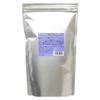Coolbe: Informasjon om varen er oppgitt av selgeren. Uavhengig av denne informasjonen har varen ingen forebyggende, diagnostiske, terapeutiske, rehabiliteringsegenskaper, er ikke et legemiddel, skal ikke brukes til medisinske formål og er ikke et medisinsk produkt. Ta kontakt med en spesialist.
-----
●Rather than drinking a lot of herbal tea at once, we recommend dividing it into two or three times a day.
A beautiful herbal tea with a bright blue color from which anthocyanin pigments are extracted. It is a romantic drink that turns pink when acidic lemon is added. Japanese name: Malva. [4g] Product number 022208880 (Category: 3) JAN code 4954753098639 [50g] Product number 016556010 (Category: 3) JAN code 4954753081358 [100g] Product number 016556020 (Category: 3) JAN code 4954753080603 [1kg] Product number 016556030 (Category: 3) JAN code 4954753080610 Scientific name Malva sylvestris / Malvaceae Extracted part Flower / Whole Country of origin Albania, Moldova Quality maintenance / Usage guidelines Unopened: 36 months after manufacture (3 years) After opening: Requires refrigeration. Please enjoy your meal as soon as possible. For hot: Pour the herbal tea into a warmed cup or teapot and pour boiling water over it. Close the lid and wait 2-3 minutes. Please adjust the amount per person to your preference, using 1 to 2 heaped teaspoons as a guide. The approximate extraction time is 2 to 3 minutes for flowers, leaves, etc., and 3 minutes for fruits, roots, etc.
~5 minutes. For ice cream: Boil boiling water to 1/2 to 1/3 the usual amount, then pour it directly into a heat-resistant glass filled with ice. *Not for cold brewing. ●Rather than drinking a lot of herbal tea at once, we recommend dividing it into two or three times a day. Please enjoy according to your physical condition. Before opening: Avoid direct sunlight, high temperature and humidity, and store in a cool, dark place. After opening: Seal and store in the refrigerator. We use herbs that are grown without the use of chemically synthesized pesticides, fertilizers, or soil conditioners, and certified by organic agricultural certification organizations such as ECO CERT, BCSOKO, and LACON QUALITAT. *However, this excludes natural pesticides, fertilizers, and soil conditioners whose safety has been confirmed by Organic JAS, ECO CERT, BCS OKO, LACON QUALITAT, etc., and whose use has been approved as not affecting the ecosystem. Examples: duck farming (biological pesticides such as natural enemies), pyrethrum extract emulsion (pesticides), compost (fertilizer) that does not contain chemically synthesized substances, etc.
















![Pine Needle Tea 45 poser x 45 Pine Needle Tea Akamatsu Pine Needle Tea Matsuba Healthy Tea Gallery (3g poser) [Innenriks 100 % cha]](https://img.joomcdn.net/21bbfaeefc984090d14a92b3b96f34e933265914_100_100.jpeg)







